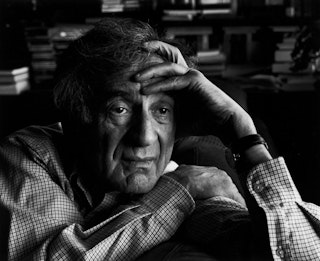
Elie Wiesel
Romanian-born American writer, professor, political activist, Nobel laureate, and Holocaust survivor.
Featured lesson
GenocideElie Wiesel was brought up in a closely knit Jewish community in Sighet, Transylvania (Romania). When he was fifteen years old, his family was herded aboard a train and deported by Nazis to the Auschwitz death camp. Wiesel’s mother and younger sister died at Auschwitz—two older sisters survived. Wiesel and his father were then taken to Buchenwald, where his father also perished. In his autobiography, Wiesel writes: "Never shall I forget that night, the first night in camp, which has turned my life into one long night, seven times cursed and seven times sealed. Never shall I forget the little faces of the children, whose bodies I saw turned into wreathes of smoke beneath a silent blue sky. Never shall I forget those flames which consumed my faith forever. Never shall I forget that nocturnal silence which deprived me, for all eternity, of the desire to live. Never shall I forget these things, even if I am condemned to live as long as God himself. Never." Wiesel has devoted his life to ensuring that the world does not forget the atrocities of the Nazis, and that they are not repeated. After the war, Wiesel became a journalist in Paris, ending his silence about his experiences during the Holocaust with the publication of Night in 1958. Translated into twenty-five languages, with millions of copies in print around the world, Night was a searing account of the Nazi death camps. Wiesel has written over forty books, and won numerous awards for his writing and advocacy. He served as the chairman of the President’s Commission on the Holocaust, and was the founding chairman of the U.S. Holocaust Memorial Council. In 1986 he won the Nobel Peace Prize. Wiesel taught at Boston University and traveled the globe advocating for human rights and the discussion of ethical issues.
Help Us Protect Human Rights
Please give now. Your contribution will make a difference in the critical effort to achieve equal rights for all.